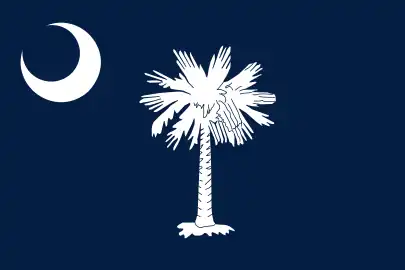United Citizens Party
The United Citizens Party (UCP) was first organized in 1969 in the U.S. state of South Carolina in response to the state Democratic Party's opposition to nominating black candidates. The party's objective was to elect blacks to the legislature and local offices in counties with black majority populations. The party ran candidates in 1970 and 1972; as a result in 1970 the first three black candidates were elected to the South Carolina House of Representatives since Reconstruction.
United Citizens Party (Patriot Party of South Carolina) | |
|---|---|
| Founded | 1969 as United Citizens Party, 1990s as Patriot Party of South Carolina, 1996 as United Citizens Party |
| Ideology | Progressivism |
| National affiliation | Reform (1996) |
In South Carolina, as in New York and unlike most other states, a single candidate may be nominated by two or more legally separate political parties. This practice is called electoral fusion. In the past, several South Carolina state legislators, who concurrently served as Democrats, were cross-endorsed by the United Citizens Party. Other political parties that have practiced fusion include the New York Conservative Party, the Working Families Party of New York and the Liberal Party of New York. The American Labor Party was a historically important party in New York State which both practiced fusion and elected candidates independently.
Since the opening up of the state Democratic Party to black candidates, the party has mainly served as a means for various third-party candidates to appear on the South Carolina Presidential ballot.
For a period of time in the 1990s the party used the name Patriot Party before returning to its original and current name.[1]
History
In 1974, the political scientists Hanes Walton Jr. and William H. Boone cited the UCP up to that point as an example of a successful sub-national African American political party.[2]
In 1996, Ross Perot was the nominee of both the Reform Party (which yielded 27,464 votes) and the United Citizens Party then known as the Patriot Party (36,913 votes).[3]
In the 2000 election, the UCP nominated Ralph Nader for President in South Carolina. He received 20,279 votes or about 1.5% of the total 1,384,253.
In the 2002 election for the Second Congressional District in South Carolina, Mark Whittington received 17,189 votes or 10.03% of the total,[4] after picketing the national headquarters of the Bank of America in Charlotte, N.C.
In 2004, the UCP chose to nominate the Socialist Party candidate Walt Brown for president. Brown received 2,124 votes or about 0.1% of the total 1,617,730. Ralph Nader appeared on the South Carolina ballot as an independent, receiving 5520 votes or 0.3%. David Cobb appeared on the new South Carolina Green Party ballot line and received 1488 votes or 0.09% of the statewide total.
In 2006, the Party endorsed John "JC" Nellums for State House District 79 (Kershaw, Richland),[5] and did not cross-endorse candidates of any other party.
On March 29, 2008, the party endorsed Barack Obama via convention for the 2008 presidential election,[6] but the nomination was not accepted. Obama appeared on the ballot as solely as the candidate of the Democratic Party.[7]
In 2010, the party cross-endorsed former football player Morgan Bruce Reeves for governor, alongside the South Carolina Green Party. Reeves received 0.9% of the vote.
On the November 2014 ballot, the party nominated Morgan Bruce Reeves for Governor and David Edmond for Commissioner of Agriculture. Reeves received 0.5% of the vote.
In 2018 and 2022, Chris Nelums ran as a United Citizens Party candidate for Commissioner of Agriculture.[8] In 2018 Nelums received 118,671 votes, or 8.85% of the vote; in 2022, he received 95,625 votes, or 6.84% of the vote.[9]
Presidential nominee
- 1972 – George McGovern
- 1984 – Dennis Serrette
- 1988 – Lenora Fulani
- 1992 – Lenora Fulani
- 1996 – Ross Perot (Patriot Party) – Party name at time see above
- 2000 – Ralph Nader
- 2004 – Walt Brown
- 2008 – Barack Obama
References
- "Ballot Access News -- September 1, 2000". Archived from the original on 2002-08-20.
- Hanes Walton Jr.; William H. Boone (September 1974). "Black political parties: A demographic analysis". Journal of Black Studies. 5 (1): 86–95. doi:10.1177/002193477400500106. S2CID 149175117.
- "Election Returns from Primaries and General Elections (Statewide)". www.scvotes.org. Archived from the original on 31 October 2006. Retrieved 15 January 2022.
- South Carolina Election Commission, Nov. 5, 2002.
- search | SCVotes.org
- Winger, Richard (editor). United Citizens Party Nominates Barack Obama for President. Ballot Access News. 2008-04-11
- "SC - Election Results", 2008 General Election Returns, South Carolina State Election Commission, p. 1, 2009-06-01, retrieved 2011-09-06
- Collins, Jeffrey (November 5, 2022). "Democrats in South Carolina trying to win 1st statewide race in 16 years". WFAE 90.7 National Public Radio. Retrieved December 12, 2022.
- "Election Results". South Carolina Election Commission. 2022. Retrieved December 12, 2022.
External links
- Kevin Gray for Governor. Archived United Citizens Party 2002 Gubernatorial campaign site. Archive date December 2, 2002. Retrieved from Library of Congress Minerva archive on June 21, 2006.
- Mark Whittington for Congress. United Citizens Party 2002 candidate for House, South Carolina, 2nd District. Archive date Dec 2, 2002. Retrieved from Library of Congress Minerva archive on January 1, 2012.
- John Roy Harper II, Chair, United Citizens Party, holds press conference, 1970
- John Roy Harper II papers, University of South Carolina
See also
- Peoples, Betsy. Historically Black political party still alive. The New Crisis. Nov/Dec 2002.
- Bursey, Brett (Summer 2000). "Is South Carolina Ready For A Progressive Third Party?". The Point: South Carolina's Independent Newsmonthly. South Carolina Progressive Network. 10 (99). Retrieved 2006-06-29.

.svg.png.webp)